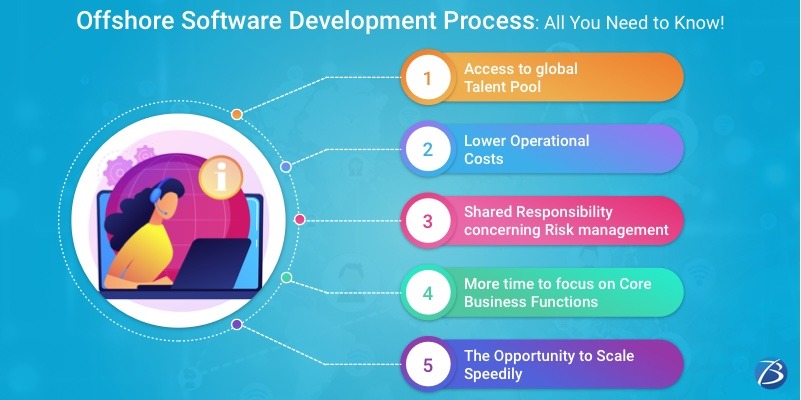Offshore Software Development Process: All You Need to Know!


The concept of ‘offshoring’ software development projects has been widely adopted ever since its inception. This approach is indeed a lucrative strategy to the path of success. But why?
Well, today most software providers are based in the U.S.A. and Western Europe. However, the development infrastructure expenses and labor costs in these countries are humongous. Consequently, it becomes increasingly challenging for businesses to cope with the dynamic and competitive market. As such, Offshore Outsourcing becomes the most viable option.
The concept of offshore outsourcing is quite complex to comprehend and often baffles entrepreneurs, particularly start-ups. So, I have penned down an all-inclusive write-up on the myriad aspects of offshoring software development projects.
Let’s commence!
Offshore Software Development: In a Nutshell
Offshore software development refers to opening up a new software development center in other countries and hiring dedicated technical professionals for this offshore development center. Employees in this company hold permanent employment just like the local employees and the only difference is that these employees are located in other countries.
Companies adopt this strategy to reap the benefits of cheaper operating costs, a huge talent pool, and the opportunity to scale speedily so that they can optimize their output and enhance their technical proficiency without having to encounter hassles or incur huge expenses.
As per research by Statista published in July 2021, it has been observed that India turns out to be the most preferred location for hiring offshore business services.
This is because an offshore software development company in India promises lower wages and easy availability of skilled professionals in comparison to Western Europe and Asia.
To cite an example, software tycoons like Google, Apple, and Microsoft have set up their R&D centers in Bangalore, India, termed the Silicon Valley of Asia.
Offshore Software Development Outsourcing Models
Fixed-price
Under this model, the client firm and the development team/company decide a fixed price as well as the timeline for project execution, and any new client requirement is usually re-evaluated concerning costs and timeframe. This approach works best when both sides are clear about the specific project needs and there are hardly any chances of deviation regarding requirements.
Dedicated Team and Resources
This model involves the outsourcing agency assigning a skilled development team for the client company and this team is treated as the client’s employees who are working remotely. This approach is suitable for long-term projects wherein the client intends to hire software developers in a flexible manner; usually for creating software with scalability scope, or for maintenance after product development.
Time and Material
As per this outsourcing model, the client makes the payment based on the resource utilization – hours of work and materials used. This approach is implemented when the client is unable to define the project needs clearly, or when a trial is being developed before crafting a full-fledged app.
When should you opt for Offshore software Development over In-house Hiring?
Hiring an outsourcing team is the best option under the following circumstances.
· Your budget is limited and you are looking for cost-cutting.
· Your region faces a dearth of the required expertise needed by your software development project.
· Your in-house professional team is too busy working on other important projects.
· You desire faster product delivery and strict adherence to timelines.
· You wish to leverage the most recent technology stack for your project and you have to hire experts for the same.
Picking the Right Software Outsourcing Agency: Factors to consider
Hiring the wrong team will create roadblocks in your path to success. So, choose wisely. Check out the major aspects to consider while you outsource your project to an offshore team or partner with a software solutions provider.
· Obtain the assistance of an experienced technology expert from your side while hiring an offshore team.
· Check the firm’s profile by evaluating earlier/ongoing projects, testimonials, blog posts, case studies, etc., and review references on business listing portals like Clutch; to gauge their overall proficiency.
· In case you have a distinct app idea, ensure that the outsourcing firm signs a non-disclosure agreement (NDA).
· Mention the technologies you would like to use in the project and clearly define the expected outcome.
· Select the right offshore development model – development centers, dedicated teams, or project-based contracts - depending on your project requirement.
· Maintain sound communication with your service provider by being in touch, providing the necessary guidance, and exercising control over the development process.
· Make sure the partner firm provides support and maintenance services post-development. This way, your software is regularly updated to the recent versions and thus retains its value.
Offshore Software Development Services: Business Benefits

Access to global Talent Pool
Entrepreneurs enjoy access to a huge pool of talented, qualified, and experienced software professionals across the globe. These professionals are not only proficient in the latest technologies, but also keep their skillset updated from time to time as per the technical advancements.
Surprisingly, many developed nations like the U.S. suffers from IT talent scarcity; whereas popular outsourcing destinations like India, China, Vietnam, etc. possess a pool of software engineering expertise.
Lower Operational Costs
Offshoring the product development process comes with the promise of much lower operational costs as compared to hiring an in-house team; owing to lower wages of employees. Moreover, you don’t need to spend on additional expenses like office space, software licenses, equipment, utilities, and recruitment processes.
Shared Responsibility concerning Risk management
Managing risks effectively while executing software development projects is a crucial factor in determining success, and should not be undermined. And the good news is that risk management becomes a shared responsibility when a project is offshored. Besides, the risks involved in the developmental process can be handled in a better way by the offshore company as it happens to be a part of its core business.
More time to focus on Core Business Functions
Unlike in-house hiring, you need not be accountable for every minute detail of the product development process as the vendor manages all important functions right from recruitment to product delivery. As such, you find more time to focus on core business activities like establishing a robust client base or interacting with business partners.
The Opportunity to Scale Speedily
It’s quite challenging to hire in-house professionals as it involves time, effort, as well as significant financial risks; resulting in work overloading, compromised product quality, and losing clients to competitors.
Outsourcing averts such crises situations as payrolls are lower and the firm is able to shoulder down periods effortlessly. Additionally, it helps in scaling up the team and the project speedily without much ado. This leads to readiness for tackling more projects and hence opens up new opportunities for your business.
Profitable Outsourcing Locations
India
India is the most lucrative location for offshoring software projects amongst all other destinations. The reason is it offers a pool of skilled developers and highly trained experts with fluent English language skills, and a comparatively lower cost of project development.
Eastern Europe
For businesses based in Western Europe, nearshoring software services to Eastern European countries is a viable option. It is useful for businesses that need continual real-time collaboration with their in-house workforce.
Latin America
Outsourcing projects to Latin America works well for companies based in North America. This is because their time zones are almost similar which enables client firms to manage projects in real-time and to establish effective communication with their offshore team.
Bottom line:
I hope this post has provided you comprehensive guidance on all aspects of the offshore software development process. This profitable approach is sure to empower your upcoming project with a proficient development team, high-quality codes and ensure a quick developmental cycle. So, think wisely and act smart!
To know more about our core technologies, refer to links below:
Other articles and publications:
Articles and publications of other companies:
- +1 (469) 277-0804
- 8305 Tripoli Trl, Frisco, TX 75034, United States
- www.biz4solutions.com/







